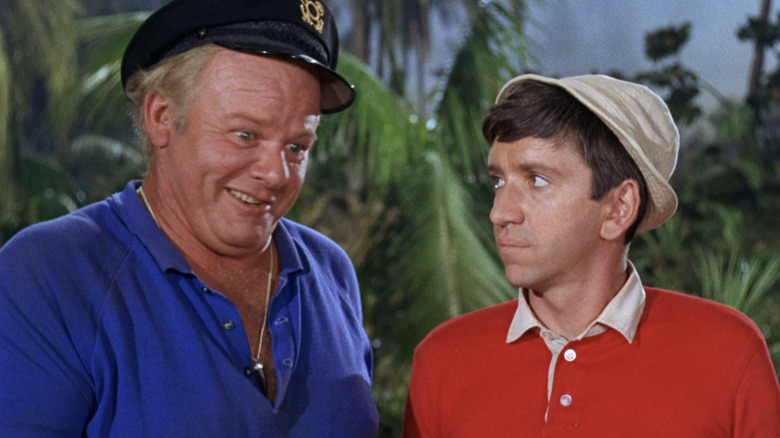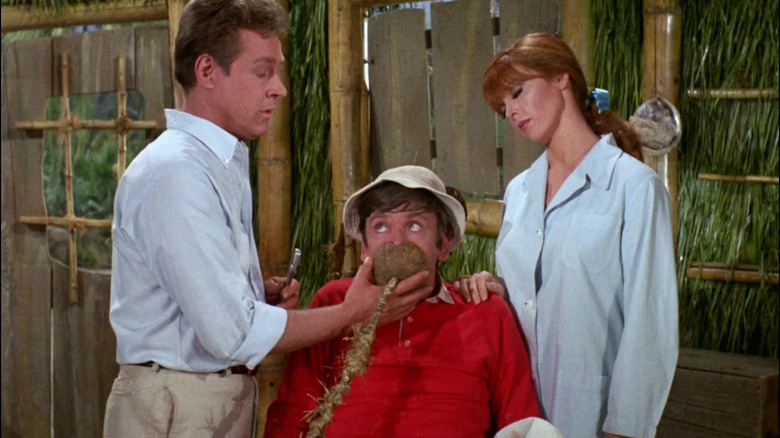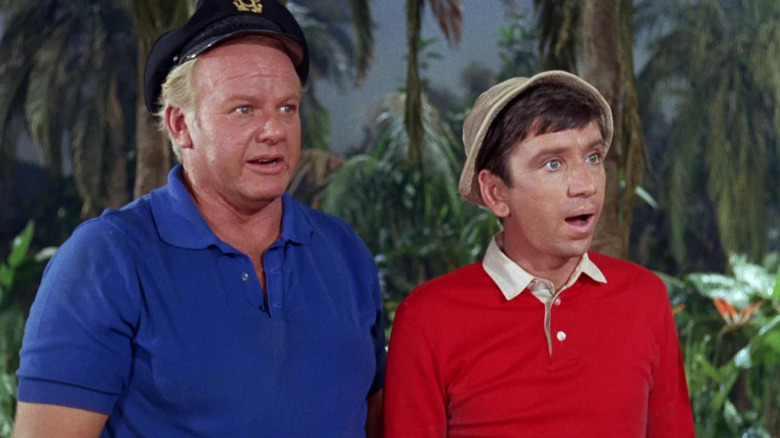CBS Tried To Manipulate Gilligan's Island Behind The Creator's Back
Back in 1961, Newt Minow, then the chairman of the Federal Communications Commission, gave an infamous speech about the state of modern television. Minow, who had just been appointed to his position, noted that nothing is better than good TV, "But when television is bad," he said, "nothing is worse." He invited his listeners to sit and watch any random 24 hours of TV and assured them that "what you will observe is a vast wasteland."
"You will see," he continued, "a procession of game shows, formula comedies about totally unbelievable families, blood and thunder, mayhem, violence, sadism, murder, Western bad men, Western good men, private eyes, gangsters, more violence, and cartoons. And endlessly, commercials — many screaming, cajoling, and offending." More than anything, he said, you will find boredom. Minow believed that there was a disconnect between what TV stations were providing and what an intelligent viewing public wanted to see.
Some agreed with Minow's assessment that most programs on TV were frivolous and distracting, offering no art or thought to the public discourse. Others found his statements to be snobbish and judgmental, lambasting entire genres as worthless when a great deal of thought and humor went into them. One of Minow's detractors was Sherwood Schwartz, the creator of "Gilligan's Island." Schwartz hated that Minow hated TV, and, in response, named the S.S. Minnow, the crashed sea vessel from his show, after Newt Minow.
Schwartz also credits Minow for giving too much power to studios, causing certain producers on "Gilligan's Island" to forcibly wrest control from him. In 1997, Schwartz was interviewed by the Television Academy, and he lamented that certain CBS studio heads — whom he names — tried to shoot extra scenes for the "Gilligan's" pilot without his knowledge.
But how will we know how those people got to the boat?
Schwartz recalled the early test screenings of the original "Gilligan's Island" pilot, and he knew exactly why they weren't well-received. It seems that CBS producer Hunt Stromberg wasn't satisfied with the future castaways merely getting on the S.S. Minnow for a three-hour tour, and wanted to see each character packing a suitcase. After all, how else was the audience to know how those people got to the boat in the first place [rolling eyes emoji].
"Very badly. They tested it because they had added [new scenes] without making me aware of it. Because I had resisted anything (except the song to open it). Hunt Stromberg had hired other writers — without my knowledge — to write scenes where they were packing; all the different people are packing to go on this little boat. That's just a stall! It was three-and-a-half minutes of dull. And I was furious because they did this without [me]. I was a producer! [...] It was really terrible."
Luckily, the longer version tested so badly that Stromberg's scenes were cut out. Additionally — as all "Gilligan's" fans know — the original pilot didn't air for many years, and several of the characters were replaced with the versions we all know and love today. Stromberg tried to add more, but his plot failed. Of course, Schwartz feels, Stromberg wouldn't have been moved to make any changes were it not for Minow.
Minow, of course, is no villain; his demand that there be more variety on TV added to the standardization of UHF knobs on TV sets, as well as the pioneering of educational and public stations like PBS. We wouldn't have "Sesame Street" without him.
But, Schwartz felt, he didn't need to be snotty about it.
The snotty New Minow
Minow made his famed "vast wasteland" speech in 1961, at a time when most TV networks had already filmed and scheduled the next year's programming, and Minow assumed that no changes were made. Studios started to step in to make changes to their lineups, trying to change them into something more intellectually stimulating. Sadly, this usually took the form of strange, arbitrary changes like multiple shots of the "Gilligan's Island" castaways packing suitcases. Schwartz continued:
"[T]hat's network control for you. Which they never used to have before Mr. Minow. Who the boat is named after, by the way. Newt Minow. He was head of the FCC. He's the one who gave control of television to the networks. [...] I spelled [the boat's name] like the fish, because I couldn't spell it with his name."
In 1968, years after "Gilligan's Island" had ended its run, a TV oversight group called the Action for Children's Television was formed, and they hyped the idea that networks have a responsibility to protect "the public interest." While brainless trash often fetched high ratings, others felt the televised medium should be more closely regulated for content. They (rightly) felt that toy tie-in shows made by toy manufacturers were damaging to the consciousnesses of kids. Some statutes were put into place dictating that a certain percentage of children's TV had to be educational (hence "Knowing is half the battle" segments in "G.I. Joe"). It was clumsy at best.
Ronald Reagan, it should be noted, changed laws while he was in office to allow advertising directly to children. It's been downhill ever since.


